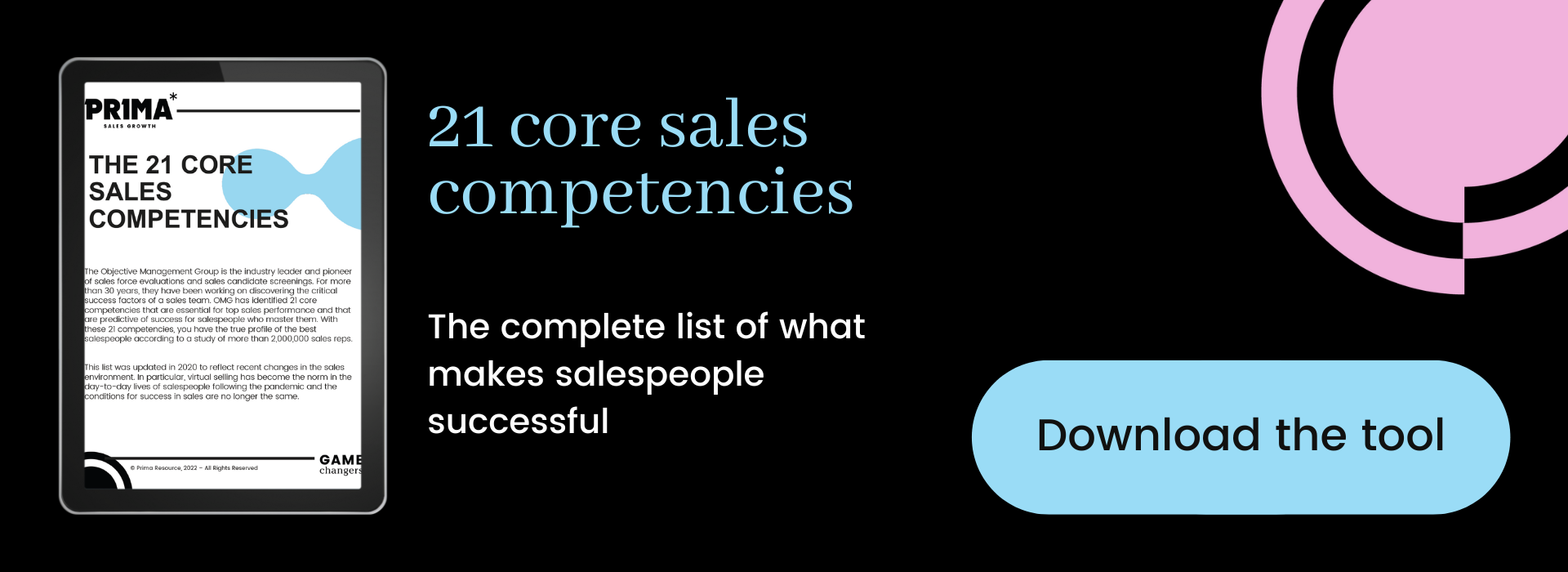
All representatives should constantly pursue a common goal: to become a better salesperson. Whether your sales career is well underway or not, several resources are available for you to continuously develop your potential.
In a previous article, I explained to you what a good salesperson is. Now, let’s look at the 6 best ways to achieve this, as well as 2 traps to avoid.
But before, let’s look at the 8 requirements for being a better salesperson…
The 8 characteristics of a good sales representative
Anyone can bid, take an order, list technical details. Most salespeople can maintain relationships. Only 5% of the reps are elite, and another 15% quite good.
So,
- how can you raise yourselves to the level of these 5 – 20% of top salespeople?
- how can you become one of those salespeople who ask difficult, risky and scary questions?
- how can you ask questions not to close a sale or qualify a prospect, and not discovery questions either; but questions that change the customer’s perception of you?
- how can you learn to ask questions that shift the conversation, to differentiate you from other salespeople?
Dave Kurlan has identified 8 vital technical sales skills and sales DNA components required to become an elite sales rep…
- Listening skills – beyond hearing and concentration, salespeople need to engage in active listening. They need to identify specific words and sentences that allow them to be more strategic, more in-depth and closer to a prospect’s compelling reasons to buy.
- Ability to ask questions – sales reps shouldn’t just keep some prepared questions on hand. They need to formulate their own so that they are more strategic, more in-depth and closer to the compelling reasons that motivate their prospects to buy.
- Tone – everyone can ask questions, but not all reps can ask them without offending. They must learn to slow down, soften, add breaks after each key sentence, smile, and most importantly, their inflection ensures that the question does not appear as a question.
- Business and finance – behind each exposed problem there’s usually a financial implication. Salespeople must be skilled enough to help their prospects do the math, including material and immaterial costs, amortized over the life of the problem.
- The need for approval – there is a difference between being likeable and making sure people like you. 58% of sales reps NEED to be loved. Being loved and making people love you is good, but needing to be loved prevents you from executing the other two. When we look elite salespeople exclusively, only 18% need to be loved, and their average score in this skill is 89% compared to 76% for all sellers.
- Controlling emotions – when a salesperson stays in the moment and isn’t distracted by his or her thoughts, he or she can execute the first element above more effectively. 63% of sellers cannot do this, while only 31% of elite sellers have difficulty doing so. Elite sellers score an average of 86% for this skill, while all sellers score 80% and weak sellers score 76%.
- Talking about money – weak salespeople get only 41%, all sellers get 58% and elite sellers 91%. 60% of all salespeople are uncomfortable with the real financial discussions, making it impossible to master item 4 above. Only 8% of elite sellers struggle to talk about money. In comparison, 85% of weak sellers are uncomfortable with these discussions.
- Following an effective sales process – consultative selling is much more difficult than relationship selling which draws out the conclusion, or transactional selling that doesn’t take time but generates fewer results. It requires a formal, step-by-step sales process, which incomplete methodologies such as Challenger Sale and SPIN don’t provide.
6 ways to become a better salesperson
- Read books on how to be a better salesperson
- Get trained
- Get coached
- Surround yourself with good salespeople
- Make sure your sales manager is competent
- Take action
Read books on how to be a better salesperson
Good salespeople take it upon themselves to improve on their own.
To do this, there are a multitude of books either in print, digital, or audio that help to improve your skills.
Besides books on sales or business, there are also excellent books on personal development. Knowing that sales is 20% technique and 80% attitude, a salesperson’s performance is closely related to their development as an individual.
The more a person works on themselves, the better they will be in sales.
These books help to work on aspects such as beliefs, paradigms, the need for approval, and the ability to recover after rejection. Not surprisingly, these are all elements of a representative’s sales DNA. They can be restrictive in certain contexts and they’re often the ones by which you differentiate the good salespeople from the bad ones.
For personal development, several salespeople follow the advice of authors such as Grant Cardone. While they bring a good dose of motivation, I think it’s especially important to investigate deeper and develop good self-knowledge to be able to fully understand others as well.
The better you know yourself, the easier it is for you to integrate and adapt to discussions. It also becomes easier to control the exchanges in which you take part.
Books on how to be a better salesperson
Here are my 6 favourites:
- Baseline Selling: How to Become a Sales Superstar by Using What You Already Know about the Game of Baseball, by Dave Kurlan;
- New Sales. Simplified.: The Essential Handbook for Prospecting and New Business Development, by Mike Weinberg;
- You Can’t Teach a Kid to Ride a Bike at a Seminar: The Sandler Sales Institute’s 7-Step System for Successful Selling, by David H. Sandler and John Hayes, PhD.
- Your Erroneous Zones, by Wayne Dyer;
- Way of the Peaceful Warrior: A Book That Changes, by Dan Millman;
- Rejection Proof: How I Beat Fear and Became Invincible Through 100 Days of Rejection, by Jia Jiang.
Get trained
Sales training is a great way to maximize your potential and gain new knowledge. Nowadays, the web offers a multitude of online training programs.
However, there are good and bad teachers. For example, many teach a transactional approach rather than consultative selling, which isn’t adapted to today’s reality.
In fact, sales training requires common sense. After a good session, the participants will say: “I never would have thought of it, and yet it’s so simple!”
Get coached
Coaching is essential.
Again, not all coaches in sales are equivalent. A good coach helps us grow and develop, while an inadequate one can be detrimental. Indeed, some coaches have important limiting beliefs that they can pass on to their students.
It’s important to trust and rely on your intuition. If you feel that you’re not working with the right person, listen to yourself!
Surround yourself with good salespeople
I strongly advise you to exchange with the best salesperson of our organization or even that of another company. But, be careful not to confuse salespeople with account managers.
How is it to be successful? What brought this person to where they are now? What are they particularly skilled at? Pay attention to their journey, because that’s what usually determines who a person is.
Moreover, it’s better to surround yourself with salespeople who excel in various competencies. They’ll each become references for different stages of the sales process.
To broaden your horizons even more, don’t hesitate to consult representatives who work in a sales environment more complex than yours. For example, a very competitive environment or one which offers a product at a much higher cost.
I should specify that these meetings don’t replace the work done with a coach. Good salespeople, however successful, aren’t necessarily pedagogues or able to adequately pass on their knowledge. What’s more, it’s not because they’re excellent that they do everything right. We must use our better judgment.
Make sure your sales manager is competent
Although a sales manager must devote 50% of their working time to coaching their team, a large proportion of them do not excel in this skill. Indeed, it’s sometimes necessary to remain critical to the advice received and to certain behaviours.
If you don’t have access to the necessary help within your company, I encourage you to go and look for it elsewhere, even if this requires a significant investment. In the long run, you’ll be a winner personally and professionally.
Take action!
Most people learn, but never execute.
Now that you’re equipped to become an elite sales rep, how do you apply your daily learning without discouraging yourself? You need to develop accountability mechanisms that will help you to be accountable and invest in change.
To this end, allying with a coach or an accountability partner is invaluable. It’s a matter of teaming up with a person who has the will and the motivation to succeed, and who thrives on success.
Regular meetings comprised of constructive exchanges are very beneficial. They’ll encourage you to continue to improve and provide the necessary support when you try new ways of doing business with your clients.
2 traps to avoid
Always relying on salespeople who have a good reputation
The fact that a person is reputed to be a good salesperson does not mean that he or she is a good salesperson. Many have obtained this title over time, more for their many years of experience than for their talent.
Following the client’s advice
Some clients sometimes give recommendations based on their perception of what a good salesperson is. But they’re clients, not representatives. In seeking to do well, they’re not aware that their advice is intended to meet their own needs. What’s adequate for one isn’t necessarily for another.
Note: Originally published on October 3, 2018, this post has been updated to ensure its accuracy and comprehensiveness.






